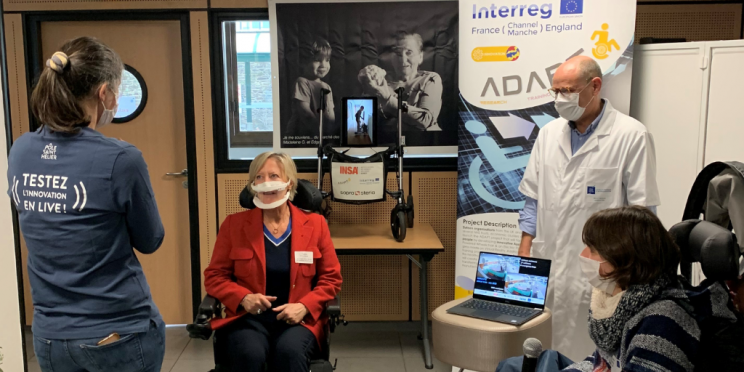French Secretary of State for People with Disabilities visits Interreg project
15/01/2021

French Secretary of State for People with Disabilities, Sophie Cluzel, visited Interreg France (Channel) England project ADAPT, to see how its smart wheelchair technology and simulator for wheelchair driving in virtual reality are benefiting patients with mobility difficulties.
The visit, organised in collaboration with the School of Engineering at INSA Rennes, took place at the Saint-Hélier Physical Medicine and Rehabilitation Centre, Rennes. During the visit, Ms Cluzel toured the centre, met with patients and learned about ADAPT’s cutting-edge technology.
Emilie Leblong (Pole Saint Hélier) and Marie Babel (INSA Rennes) welcomed Ms Cluzel, who was accompanied by Mr Gaël Le Bohec, Member of Parliament for Ille-et-Vilaine and Dr Phillipe Denormandie, a leading expert on improving access to care for people with disabilities.
Project lead, Nicolas Ragot, from ESIGELEC, said: “This was a great occasion to demonstrate to the French highest state institutions how our ADAPT technologies are helping to improve quality of life and mobility for those living with disabilities.
“This visit follows on from one that Frédérique Vidal, Minister of Higher Education and Research, made in January 2019 at INSA Rennes. It shows the high regard that French government and its institutions place on the work that we are doing to make our society more inclusive.”
The EU has a growing number and share of older people and relatively high rates of chronic illness and disability. For some, the use of electronic wheelchair is the primary method for maintaining independence and social interactions.
ADAPT (Assistive Devices for Empowering Disabled People Through Robotic Technologies) uses assistive technology to improve the functionality and performance of powered wheelchairs. It empowers the user with technologies such as obstacle avoidance, route selection and autonomous driving.
The smart electronic powered wheelchair also reports on the user’s health by sending real-time information via the internet, enabling healthcare professionals to monitor any changes in the user’s health.
The five-year project, which is a collaboration between fifteen organisations across the UK and France, was funded by Interreg FCE in 2017 and received 5.9 million euros in ERDF funding.
The project is expected to reach up to 300,000 electric wheelchair users in the Channel area and help train more than 15,000 healthcare professionals by its completion in June 2022.
